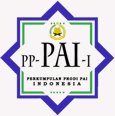Teaching Islamic Studies for Inclusive Citizenship in Indonesia and the United States of America: Teachers’ Perspectives
Abstract
Keywords
Full Text:
PDFReferences
Aasim, Padela, Malik, S., & Ahmed, N. (2018). Acceptability of Friday Sermons as a Modality for Health Promotion and Education. Journal of Immigrant Minority Health, 20, 1075-1084. doi:10.1007/s10903-017-0647-8
Alper, S., Bayrak, F., Us, E. Ö., & Yilmaz, O. (2020). Do changes in threat salience predict the moral content of sermons? The case of Friday Khutbas in Turkey. European Journal of Social Psychology, 50, 662-672. doi:http://10.1002/ejsp.2632
Attaran, M. (2015). Moral Education, Habituation, and Divine Assistance in View of Ghazali. Journal of Research on Christian Education(1), 43-51. doi:10.1080/10656219.2015.1008083
Ayoade, A. H. (2020). The Concept of Rote Learning and its Applications in the Teaching and Learning of Qurʾān and Sunnah. AL-BURHĀN, 4(2), 53-62.
Berglund, J. (2015). ANALYSIS PAPER: Publicly Funded Islamic Education in Europe and the United States. Retrieved from Washington, DC:
Brifkani, I. (2021). Whole Child Education in the Context of Islamic Schools in the United States: Principals’ Perspectives. Religious Education, 116(2), 116-128.
Creswell, J. W. (2002). Educational Research: Planning, Conducting, and Evaluating Quantitative and Qualitative Research. Upper Saddle River: Merill Prentice Hall.
Driessen, G., & Merry, M. S. (2006). Islamic Schools in the Netherlands: Expansion or Marginalization? Interchange, 37(3), 201-223.
El-Atwani, K. (2015). Envisioning Multicultural Education Development in U.S. Islamic Schools in Light of Reviewed Literature. Multicultural Perspectives, 17(3), 145-151. doi:10.1080/15210960.2015.1053314
Errihani, M. (2011). Managing religious discourse in the mosque: the end of extremist rhetoric during the Friday sermon The Journal of North African Studies, 16(3), 381-394. doi:10.1080/13629387.2010.515411
Esposito, J. L. (1998). Islam The Straight Path (Third ed.). New York and Oxford: Oxford University Press.
Glenn, C. L. (2016). Muslims in the Melting Pot: A Monthly Journal of Religion and Public Life. First Things, April(262), 21-24.
Haddad, Y. Y., & Smith, J. I. (Eds.). (1994). Muslim Communities in North America. Albany: State University of New York Press.
Halstead, J. M. (2004). An Islamic Concept of Education. Comparative Education, 40(4), 517-529.
Hasan, N. (2008). The Salafi Madrasas in Indonesia. In F. A. Noor & M. v. Bruinessen (Eds.), The Madrasa in Asia: Political Activism and Transnational Linkages (pp. 247-274). Amsterdam: Amsterdam University Press.
Hasan, N. (2012). Education, Young Islamists and Integrated Islamic Schools in Indonesia. Studia Islamika, 19(1), 89-111.
Hashem, M. (2010). The Ummah in the Khutba: A Religious Sermon or a Civil Discourse? . Journal of Muslim Minority Affairs, 30(1), 49-61. doi:http://10.1080/13602001003650606
Hefner, R. W. (2009). Islamic Schools, Social Movements, and Democracy in Indonesia. In R. W. Hefner (Ed.), Making Modern Muslims: The Politics of Islamic Education in Southeast Asia (pp. 55-105). Honolulu: University of Hawai'i Press.
Hefner, R. W., & Zaman, M. Q. (Eds.). (2007). Schooling Islam: The Culture and Politics of Modern Muslim Education. New Jersey: Princeton University Press.
Heggart, K. (2020). Activist Citizenship Education: A Framework for Creating Justice Citizens. Singapore: Springer.
Institute for Social Policy and Understanding (ISPU). (2018). Weekend Islamic Schools: Are They Preparing Children for Life Ahead? Retrieved from Michigan: https://www.ispu.org/weekend-islamic-schools-are-they-preparing-children-for-life-ahead/
Kingham, R. (2008). Indonesian islamic education and Australia, then and now: a personal and inside view. Review of Indonesian and Malaysian Affairs, 42(1), 9-19.
Miles, M. B., & Huberman, A. M. (1994). Qualitative Data Analysis. Thousands Oaks: SAGE Publications.
Millie, J. (2017). Hearing Allah’s Call : Preaching and Performance in Indonesian Islam (Vol. Cornell University Press,): Itacha.
Pew Research Center. (2017). U.S. Muslims Concerned About Their Place in Society, but Continue to Believe in the American Dream. Retrieved from file:///Users/raihani/Downloads/U.S.-MUSLIMS-FULL-REPORT-with-population-update-v2.pdf
Raihani. (2012). A Report on Multicultural Education in Pesantren. Compare: A Journal of Comparative and International Education. doi:10.1080/03057925.2012.672255
Raihani. (2014). Creating Multicultural Citizens: a portrayal of contemporary Indonesian education. New York: Routledge.
Raihani. (2018). Curriculum Reform in the Indonesian Madrasah. In M. A. Bakar (Ed.), Rethinking Madrasah Education in a Globalised World (pp. 210-227). London: Routledge.
Samuri, M. A. A., & Hopkins, P. (2017). Voices of Islamic Authorities: Friday Khutba in Malaysian Mosques. Islam and Christian–Muslim Relations, 28(1), 47-67.
Sbai, Y. (2019). Islamic Friday Sermon in Italy: Leaders, Adaptations, and Perspectives. Religions, 10(312). doi:http://dx.doi.org/10.3390/rel10050312
Subhan, A. (2012). Lembaga Pendidikan Islam Indonesia Abad ke-20. Jakarta: Kencana.
Suharto, T. (2017). Transnational Islamic education in Indonesia: an ideological perspective. Contemporary Islam, 12, 101-122. doi:https://doi.org/10.1007/s11562-017-0409-3
Tan, C. (2014). Educative Tradition and Islamic Schools in Indonesia. Journal of Arabic and Islamic Studies, 14, 47-62.
Tan, C., & Ibrahim, A. (2017). Humanism, Islamic Education, and Confucian Education Religious Education, 112(4), 394-406. doi:10.1080/00344087.2016.1225247
Tayeb, A. M. (2018). Islamic Education in Indonesia and Malaysia: Shaping Minds, Saving Souls. London: Taylor & Francis Group.
Timani, H. S. (2006). Islamic Schools in America: Islam's Vehicle to the Future? Forum on Public Policy Online, v2006 Fall(1).
Underabi, H. (2020). “Backstage” Responses to the Sydney Siege: A Casestudy of the Sermons Delivered in the Mosques of Sydney in the Aftermath of the Incident. Journal of Muslim Minority Affairs 40(2), 235-254. doi:10.1080/13602004.2020.1783769
Underwood, C. R., & Kamhawi, S. S. (2014). Friday sermons, family planning and gender equity attitudes and actions: evidence from Jordan. Journal of Public Health, 37(4), 641-648.
United States Institute of Peace. (2002). Islam and Democracy. Special Report, 93.
Usman, A. H., & Iskandar, A. (2021). Analysis of Friday Sermon Duration: Intellectual Reflection of Classical and Contemporary Islamic Scholars Journal of Religious & Theological Information,. doi:10.1080/10477845.2021.1928349
Zuhdi, M. (2005). The 1975 Three-Minister Decree and the Modernization of Islamic Education in Indonesia. American Educational History Journal, 32(1), 36-43.
DOI: http://dx.doi.org/10.24014/potensia.v11i1.36827
Refbacks
- There are currently no refbacks.
Copyright (c) 2025 POTENSIA: Jurnal Kependidikan Islam

Potensia: Jurnal Kependidikan Islam
E-ISSN: 2442-5605
Published By:
Fakultas Tarbiyah dan Keguruan Universitas Islam Negeri Sultan Syarif Kasim Riau, Indonesia
Mailing Address:
Jl. H.R Soebrantas Km. 15 No. 155 Kelurahan Simpang Baru Kecamatan Tuah Madani, Pekanbaru, Riau, Indonesia
email: potensia.ftk@uin-suska.ac.id
Indexed By:
POTENSIA: Jurnal Kependidikan Islam is licensed under a Creative Commons Attribution 4.0 International License.

_-_Copyy2_(1)_copy1.jpg)



.jpg)
.png)
.jpg)
.jpg)




